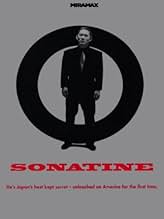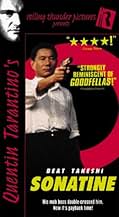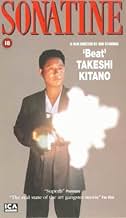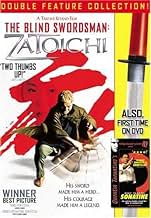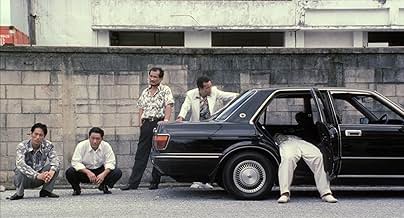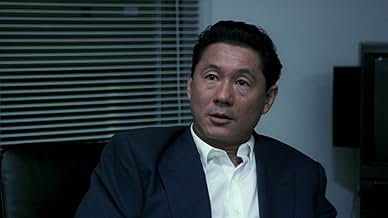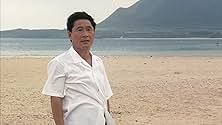Varios yakuza de Tokio son enviados a Okinawa para ayudar a poner fin a una guerra de bandas. Después, la guerra se intensifica y los errantes de Tokio deciden esconderse en la playa.Varios yakuza de Tokio son enviados a Okinawa para ayudar a poner fin a una guerra de bandas. Después, la guerra se intensifica y los errantes de Tokio deciden esconderse en la playa.Varios yakuza de Tokio son enviados a Okinawa para ayudar a poner fin a una guerra de bandas. Después, la guerra se intensifica y los errantes de Tokio deciden esconderse en la playa.
- Premios
- 4 premios ganados y 1 nominación en total
- Dirección
- Guionista
- Todo el elenco y el equipo
- Producción, taquilla y más en IMDbPro
Opiniones destacadas
In my opinion either you love this film or you hate it, there is no in between, since its so different from the standard or even great gangster movies of our time . I for myself was mesmerized by its artistic beauty, its compelling acting and its wonderful soundtrack.
By now i have seen Hanabi and all the other Kitano movies, but this remains the best to me..
I love how the only emotions Murakawa expresses are humor and nihilist apathy. The "sumo scene" is so delightfully out-of-place, while the ending simply leaves your mouth open. The warmth the characters show just makes it more hurtful when they meet such pathetic, low-key ends. I'm not an expert on Japanese society, but I see this film as a comment on the emptiness of a fear-filled culture of reservation, where it is more important to show restraint and respect than it is to continue living.
I'll still enjoy good ol' HK pistol operas, but I'll never see them quite the same again.
It begins with very unsentimentalized and nonglorified violence. People hit and kill each other and it isn't much different than toast popping out of the toaster. It is fast, moderately bloody, and there. Kitano doesn't seem to be interested in thrilling us with either the danger, grotesqueness, or thrill of violence--another, not clearly defined agenda is at work here.
At perhaps a third of the way into the film, it makes a sudden transition from this gangster life to a period of forced inactivity. I suspect this section, which is delightfully playful, is at the heart of this film.
¿Sabías que…?
- TriviaThe title Sonatine comes from the musical term sonatina. Kitano said that when learning the piano, when the learner gets to sonatinas they have to decide where they want to go, whether it is to classical, jazz or popular music; marking the point of crucial decision making. This refers to the character Murakawa in the film.
- Citas
Miyuki: You're tough. I love tough guys.
Aniki Murakawa: I wouldn't carry a gun if I were tough.
Miyuki: You can shoot without a second thought.
Aniki Murakawa: I shoot fast because I get scared fast.
Miyuki: But you're not afraid of dying, are you?
Aniki Murakawa: When you're scared all the time, you reach a point when you wish you were dead.
- Créditos curiososAt the end of the closing credits, various shots of the beach that were taken a year or so later, are included.
- ConexionesFeatured in Century of Cinema: Nihon eiga no hyaku nen (1995)
Selecciones populares
- How long is Sonatine?Con tecnología de Alexa
Detalles
Taquilla
- Total en EE. UU. y Canadá
- USD 58,834
- Fin de semana de estreno en EE. UU. y Canadá
- USD 17,527
- 12 abr 1998
- Total a nivel mundial
- USD 58,834


